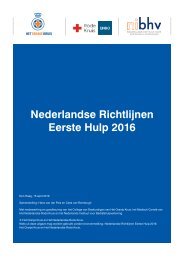Thesis-Anne-Vos-Masters-SBR-and-EU-Law-3
Thesis-Anne-Vos-Masters-SBR-and-EU-Law-3
Thesis-Anne-Vos-Masters-SBR-and-EU-Law-3
You also want an ePaper? Increase the reach of your titles
YUMPU automatically turns print PDFs into web optimized ePapers that Google loves.
safeguarding of the drinking water, which is of high importance due to the fact that this is<br />
considered a national interest <strong>and</strong> an imperative reason of overriding public interest.<br />
3. Furthermore, with regard to the participation principle, the involvement of the citizens should<br />
truly be realised. When looking at the Recommendation, the aspect of the involvement of the<br />
citizens when reviewing the Recommendation is especially important. With regard to the Draft<br />
MSL, it should be pointed out that the submitted zienswijzen should really be addressed <strong>and</strong> not be<br />
easily set aside. Shale gas extraction is a sensitive matter, which makes this even more important.<br />
4. Next, the current Dutch regulation should be made more in line with the integration <strong>and</strong><br />
environmental principles. Especially with regard to the Mining act, environmental requirements<br />
should be integrated. Currently, no environmental aspects can be considered here when deciding<br />
on extraction or exploration permits. This st<strong>and</strong>s in contrast with inter alia the Mining Waste<br />
Directive which is considered as an actual environmental directive, while the Mining Act is more an<br />
economical regulation.<br />
5. Closely related to the prior recommendation (<strong>and</strong> the same principles referred there), it could<br />
even be argued that, especially on the Dutch level, the current regulation covering shale gas<br />
activities should be more centralised <strong>and</strong> clear. Currently it is very fragmentised <strong>and</strong> spread<br />
over many regulations. The same could be said on the <strong>EU</strong> level. The Commission has just adopted<br />
a recommendation which provides for an overarching framework, which can be welcomed.<br />
However, this is not (formally) legally binding whereby parties are still dependent on the<br />
fragmented legislation. More central regulation would prevent environmental gaps from occurring.<br />
This (or at least the prior recommendation) should be (formally) adopted within a reasonable<br />
amount of time, since it would be too late if environmental adverse effects would already occur.<br />
6. Subsequently, from the integration principle it could also be read that the regulation on shale gas<br />
in the Netherl<strong>and</strong>s should not only be decided by the Minister of Economic Affairs, but should (at<br />
least more explicit <strong>and</strong> clear) be co-decided <strong>and</strong> co-signed by the Minister of Infrastructure<br />
<strong>and</strong> Environment. In this manner, the environmental requirements can really be taken into<br />
account <strong>and</strong> a sincere balancing act can be carried out between the environmental <strong>and</strong> economic<br />
aspects. This would also enhance public acceptance <strong>and</strong> integration, since this would assure<br />
citizens that an actual balance has been made.<br />
7. With regard to the environmental principles, it can be argued that several zones should be<br />
excluded from shale gas activities. These include the 1000 metres zones, the bore free zones<br />
<strong>and</strong> the zones appointed by the provinces. Currently, those zones are not excluded by the Draft<br />
MSL. This is not in line with the environmental principles as set out above. The exclusion hereof<br />
would be in line with the reasoning <strong>and</strong> ratio of the environmental principles <strong>and</strong> would moreover<br />
lead to more public acceptance <strong>and</strong> trust.<br />
8. Moreover, the Dutch government should decide on how to balance two national interests.<br />
Currently this is not clear, while this can lead to very controversial decisions. Especially in the<br />
current case, where the two national interests at stake are both important for different reasons, this<br />
is debatable.<br />
If all these recommendations do not seem possible, it could be wondered whether the exploration<br />
<strong>and</strong> extraction of shale gas should then actually occur at all in the <strong>EU</strong> <strong>and</strong> the Netherl<strong>and</strong>s.<br />
Otherwise it would be accompanied by too many problems, concerns <strong>and</strong> insecurities for the<br />
society <strong>and</strong> the environment.<br />
102



